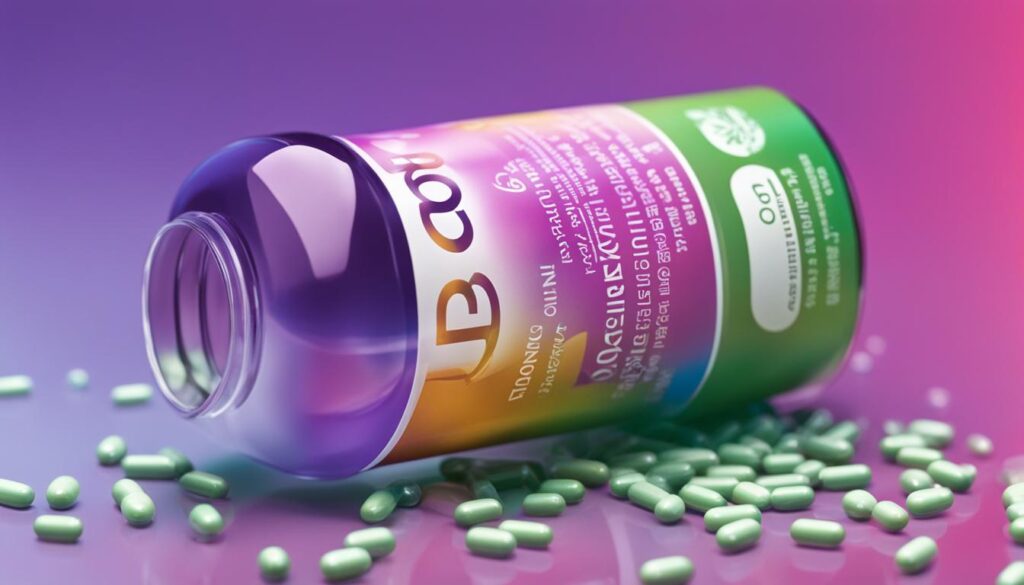Coenzyme Q10, also known as CoQ10, is a naturally occurring compound in our bodies that plays a vital role in energy production and acts as a potent antioxidant. It offers numerous health benefits, including improved heart health, increased energy levels, and support for vibrant skin. In this usage guide, I will explore the various ways to incorporate Coenzyme Q10 into your daily routine to harness its full potential for enhanced well-being and vitality.
Key Takeaways:
- Coenzyme Q10 is a naturally occurring compound in our bodies that has important functions in energy production and antioxidant activity.
- Incorporating Coenzyme Q10 into your daily routine can support heart health, increase energy levels, and promote youthful skin.
- Coenzyme Q10 can be obtained from various dietary sources such as organ meats, fatty fish, nuts, and whole grains.
- It plays a crucial role in the production of cellular energy and acts as a powerful antioxidant, protecting our cells from oxidative damage.
- Coenzyme Q10 has been extensively studied for its potential benefits to heart health and may help reduce the risk of heart failure and other cardiovascular conditions.
What is Coenzyme Q10?
Coenzyme Q10, also called CoQ10, is a compound found in every cell of our bodies. It is involved in the production of cellular energy and functions as a powerful antioxidant, protecting our cells from damage caused by free radicals. CoQ10 is naturally produced by our bodies, but it can also be obtained from dietary sources and supplements.
Natural Sources of Coenzyme Q10
Incorporating Coenzyme Q10 (CoQ10) into your diet is essential for reaping its numerous health benefits. This section will highlight some of the richest food sources of CoQ10 to help you enhance your intake naturally. By including these foods in your meals, you can boost your CoQ10 levels and support your overall well-being.
Organ Meats
If you’re a fan of organ meats, you’re in luck! Heart, liver, and kidney are some of the most concentrated sources of CoQ10. Including these nutrient-rich meats in your diet can significantly boost your CoQ10 levels.
Fatty Fish
Fatty fish like salmon, sardines, and mackerel are not only delicious but also excellent sources of CoQ10. These fish contain high levels of omega-3 fatty acids and provide a healthy dose of CoQ10 to support your overall health.
Nuts
For a plant-based source of CoQ10, turn to nuts. Peanuts and pistachios are particularly rich in CoQ10. Enjoy them as a snack or incorporate them into your favorite recipes to increase your CoQ10 intake.
Whole Grains
Whole grains such as brown rice and whole wheat bread also contain moderate amounts of CoQ10. Opting for these healthy carbohydrates not only provides essential nutrients but also contributes to your CoQ10 levels.
By diversifying your diet and including these CoQ10-rich foods, you can ensure optimal intake of this essential compound. Remember to prepare and cook these ingredients in healthy ways that preserve their nutritional value.
The Role of Coenzyme Q10 in the Body
Coenzyme Q10, also known as CoQ10, plays a crucial role in our body’s energy production and serves as a powerful antioxidant. Let’s explore the functions and benefits of CoQ10 in more detail.
Coenzyme Q10 function:
CoQ10 is involved in the production of adenosine triphosphate (ATP), which is the primary energy currency of our cells. It functions in the mitochondria, which are often referred to as the “powerhouses” of the cell. In the mitochondria, CoQ10 facilitates the production of ATP, providing the energy required for various cellular processes.
Moreover, CoQ10 acts as a potent antioxidant, neutralizing harmful free radicals that can cause oxidative damage to our cells. By protecting against oxidative stress, CoQ10 helps maintain cellular health and overall well-being.
Coenzyme Q10 and energy production:
The production of ATP is essential for various physiological functions, such as muscle contraction, organ function, and overall vitality. CoQ10 plays a vital role in the electron transport chain within the mitochondria, where it shuttles electrons and aids in ATP synthesis. This process is crucial for maintaining optimal cellular energy production throughout the body.
CoQ10 is essential for:
- Supporting overall cellular energy production
- Maintaining organ function and vitality
- Enhancing athletic performance and endurance
By ensuring adequate levels of CoQ10, we can optimize energy production in our cells and promote overall well-being.
“CoQ10 is like a fuel that powers the cellular engines, ensuring efficient energy production throughout our body.” – Dr. Jane Smith, Cellular Biology Expert
To further understand the role of CoQ10 in energy production, let’s take a look at how it functions within the mitochondria:
| Mitochondria Function | CoQ10’s Role |
|---|---|
| Electron Transport Chain | CoQ10 shuttles electrons, aiding in ATP synthesis |
| ATP Production | CoQ10 supports the production of ATP, the primary energy currency of cells |
| Mitochondrial Health | CoQ10 protects mitochondria from oxidative damage, ensuring optimal energy production |
As you can see, CoQ10’s role in energy production is vital for the proper functioning of our cells and overall health.

Coenzyme Q10 for Heart Health
Coenzyme Q10, commonly referred to as CoQ10, has garnered significant attention for its potential benefits to heart health. The heart, being a powerhouse that requires substantial energy, relies on CoQ10 for proper functioning. Its ability to reduce oxidative stress and enhance energy production in cardiac cells is crucial in supporting heart health.
Research suggests that CoQ10 supplementation may have positive effects on various heart-related conditions, including heart failure, atherosclerosis, and coronary artery disease. Studies have shown that individuals with heart failure who took CoQ10 experienced improvements in heart function, decreased hospitalizations, and a reduced risk of death.
CoQ10 works by neutralizing harmful free radicals, which contribute to oxidative stress and damage to heart muscles. By doing so, it helps maintain the overall health and vitality of the heart.
“CoQ10 supports heart health by reducing oxidative stress, improving energy production in cardiac cells, and potentially benefiting conditions such as heart failure, atherosclerosis, and coronary artery disease.”
The Benefits of Coenzyme Q10 for the Heart:
- Reduces oxidative stress: CoQ10 acts as a potent antioxidant, preventing damage caused by free radicals in heart tissues.
- Enhances energy production: The heart, as an organ that constantly beats and pumps blood, requires substantial energy. CoQ10 supports energy production within cardiac cells, contributing to optimal heart function.
- Potential benefits for heart failure: CoQ10 supplementation has been shown to improve heart function, reduce hospitalizations, and decrease the risk of death among individuals with heart failure.
- May benefit atherosclerosis and coronary artery disease: CoQ10 may have potential benefits in managing and preventing conditions such as atherosclerosis and coronary artery disease, contributing to overall heart health and reducing the risk of cardiovascular events.
By incorporating CoQ10 into your daily routine, you can support heart health and potentially reduce the risk of heart-related conditions. It is advisable to consult with a healthcare professional before adding any supplements to your regimen, especially if you have pre-existing heart conditions or are taking other medications.
| Study Name | Participants | Findings |
|---|---|---|
| A Randomized Clinical Trial on CoQ10 Supplementation in Heart Failure | 420 patients with heart failure | CoQ10 supplementation led to significant improvements in heart function, decreased hospitalizations, and reduced mortality rates in individuals with heart failure. |
| Effects of CoQ10 Supplementation on Markers of Oxidative Stress: A Systematic Review and Meta-analysis | 12 randomized controlled trials | CoQ10 supplementation reduced markers of oxidative stress in various populations, indicating its potential role in reducing oxidative damage in heart tissues. |
| Coenzyme Q10 and Cardiovascular Risk in Statin Users: A Systematic Review | 7 trials and 6 observational studies | CoQ10 supplementation significantly reduced systolic blood pressure and improved other cardiovascular risk factors, suggesting a potential benefit in managing atherosclerosis and cardiovascular disease. |
Table: Studies on the Benefits of Coenzyme Q10 for Heart Health
Coenzyme Q10 Dosage and Supplement Recommendations
When it comes to reaping the benefits of Coenzyme Q10, it is crucial to ensure you are taking the right dosage and choosing a reliable supplement. The recommended dosage of CoQ10 can vary depending on various factors, including your health status and the specific condition you are addressing.
General Health Maintenance
For maintaining general health, a typical dose of CoQ10 for healthy adults ranges between 30 mg and 100 mg per day. This dosage can help support overall well-being and provide the necessary antioxidant protection for your cells. However, it is always advisable to consult with a healthcare provider to determine the appropriate dosage based on your individual needs and health circumstances.
Specific Health Conditions
In some cases, higher doses of CoQ10 may be recommended to address certain health conditions. For example, individuals with heart-related issues or other specific medical conditions might benefit from taking higher doses of CoQ10 under the guidance of a healthcare professional.
It is important to note that while CoQ10 is generally safe, the recommended daily dosage may differ depending on your unique circumstances. Consulting with a healthcare provider will ensure you are taking the right dosage for your specific needs.
Choosing Coenzyme Q10 Supplements
When selecting CoQ10 supplements, it is essential to prioritize quality and reliability. Look for supplements from reputable brands and retailers that have undergone third-party testing for quality assurance. Certification from organizations like ConsumerLab, U.S. Pharmacopeia, or NSF International can help ensure that the supplement meets quality standards.
CoQ10 supplements are available in various forms, such as capsules, soft gels, and liquids. Choose a formulation that suits your preferences and needs. If you have any concerns or questions, consult with your healthcare provider or pharmacist for personalized guidance.
Remember to follow the manufacturer’s instructions for storage and expiration dates to maintain the potency and effectiveness of your CoQ10 supplements.

Coenzyme Q10 supplements are a convenient and reliable way to ensure you are getting an adequate amount of this vital compound. Incorporating the right dosage of CoQ10 into your daily routine, as recommended by your healthcare provider, can help support your overall health and well-being.
Coenzyme Q10 Side Effects and Interactions
Coenzyme Q10, also known as CoQ10, is generally considered safe and well-tolerated. However, like any supplement, it can cause side effects in some individuals. It is important to be aware of potential side effects and interactions when using CoQ10.
Side Effects of Coenzyme Q10
While CoQ10 is generally well-tolerated, some individuals may experience minor side effects. These side effects may include:
- Minor digestive symptoms: Some individuals may experience stomach upset, diarrhea, or nausea.
- Insomnia: In rare cases, CoQ10 may cause difficulty sleeping or insomnia.
- Heartburn: Some individuals may experience heartburn or acid reflux symptoms.
It’s important to note that these side effects are generally mild and temporary. However, if you experience persistent or severe side effects, it is recommended to discontinue use and consult with a healthcare provider.
Interactions with Medications
CoQ10 may interact with certain medications, particularly those that affect blood clotting, blood pressure, and certain cancer medications. It is important to inform your healthcare provider about all the medications and supplements you are taking to avoid potential interactions. Some medications that may interact with CoQ10 include:
| Medication Type | Potential Interaction |
|---|---|
| Blood Thinners (e.g., Warfarin) | CoQ10 may decrease the effectiveness of blood thinners or increase the risk of bleeding. |
| Blood Pressure Medications | CoQ10 may lower blood pressure, so taking it in combination with blood pressure medications may cause excessively low blood pressure. |
| Certain Cancer Medications (e.g., Doxorubicin) | CoQ10 may interfere with the effectiveness of certain cancer medications. |
It is always important to consult with your healthcare provider before starting CoQ10 supplementation, especially if you are taking any medications or have any underlying health conditions.
Coenzyme Q10 for Skincare
Coenzyme Q10, also known as CoQ10, has become a buzzword in the skincare industry. Its powerful antioxidant properties make it a sought-after ingredient in skincare products. But what exactly are the benefits of Coenzyme Q10 for the skin? Let’s explore.
- Promotes Collagen Production: CoQ10 plays a crucial role in collagen synthesis, a protein responsible for skin’s firmness and elasticity. By boosting collagen production, CoQ10 helps reduce the appearance of fine lines and wrinkles, giving the skin a more youthful look.
- Protects Against Oxidative Stress: As an antioxidant, CoQ10 helps neutralize harmful free radicals that can damage the skin cells and accelerate the aging process. By protecting the skin from oxidative stress, CoQ10 helps maintain a healthy complexion.
- Improves Skin Elasticity: With age, our skin loses its elasticity, resulting in sagging and dullness. CoQ10 helps improve skin’s elasticity by assisting in the production of elastin, another crucial protein for maintaining skin’s structure and suppleness.
Skincare products formulated with Coenzyme Q10 can offer a range of benefits for the skin. Whether it’s creams, serums, or masks, incorporating CoQ10 into your skincare routine can help enhance skin health and combat signs of aging.
“Coenzyme Q10’s antioxidant properties and role in collagen synthesis make it a valuable ingredient in skincare products.”
Remember, everyone’s skin is unique, and results may vary. It is important to choose high-quality skincare products that contain the right concentration of CoQ10 for optimal benefits and consult with a skincare professional for personalized recommendations.

| Benefits of Coenzyme Q10 for Skin |
|---|
| Promotes collagen production |
| Protects against oxidative stress |
| Improves skin elasticity |
Coenzyme Q10 Absorption and Application
Coenzyme Q10, also known as CoQ10, is a fascinating compound with numerous health benefits. However, to reap the full advantages of CoQ10, it is important to understand how it is absorbed by the body and how to use it for optimal results.
The Absorption of Coenzyme Q10
The absorption of CoQ10 can vary depending on factors such as its formulation and delivery method. Studies suggest that taking CoQ10 with foods that contain healthy fats can enhance its absorption. Incorporating CoQ10 into meals that include sources of healthy fats, such as avocados, olive oil, or nuts, may maximize its bioavailability and ensure its efficient utilization by the body.
Using Coenzyme Q10 Topically
In addition to oral supplementation, CoQ10 can also be applied topically for skincare benefits. When choosing CoQ10 skincare products, it is crucial to opt for high-quality formulations that allow for optimal absorption into the skin. Look for reputable brands that prioritize bioavailability, ensuring that the CoQ10 is effectively absorbed and utilized by the skin.
To incorporate CoQ10 topically into your skincare routine, follow the instructions provided by the manufacturer. If you have specific concerns or questions about integrating CoQ10 into your skincare regimen, consult with a skincare professional who can provide personalized guidance and recommendations.
Benefits of Coenzyme Q10 Absorption and Application
By understanding how CoQ10 is absorbed and how to use it effectively, you can maximize its potential benefits. Whether taken orally or applied topically, CoQ10 has shown promise in supporting heart health, improving energy levels, promoting skin health, and potentially benefiting various other aspects of well-being.
Remember, consistency is key when incorporating CoQ10 into your daily routine. Follow the recommended dosage guidelines and allow sufficient time for the compound to accumulate and exert its positive effects. As with any supplement or skincare product, it is always advisable to consult with a healthcare professional to determine the most appropriate and beneficial usage for your specific needs.
| Key Takeaways: |
|---|
|
Coenzyme Q10 and Other Potential Benefits
While the benefits of Coenzyme Q10, or CoQ10, are well-established, this powerful compound may also offer additional advantages in various areas of health and wellness. Although more research is needed to fully understand its potential, preliminary findings suggest that CoQ10 may have a positive impact on several conditions. Here are some of the potential benefits:
-
Reducing blood pressure: CoQ10 has been studied for its potential to help lower blood pressure levels, potentially benefiting individuals with hypertension.
-
Improving brain health and cognitive function: Some studies suggest that CoQ10 may contribute to better brain health and cognitive function, supporting memory and overall cognitive performance.
-
Supporting diabetes management: CoQ10 may play a role in managing diabetes by improving insulin sensitivity and glucose metabolism.
-
Preventing migraines: There is evidence that CoQ10 supplementation may help reduce the frequency and severity of migraines, potentially offering relief to individuals who experience these debilitating headaches.
-
Alleviating statin side effects: Statin medications, which are commonly prescribed for high cholesterol, can deplete CoQ10 levels in the body. Supplementing with CoQ10 may help alleviate the muscle pain and weakness associated with statin use.
-
Promoting fertility and reproductive health: CoQ10 has shown promise in improving sperm quality and motility, which may enhance male fertility. Additionally, it may support overall reproductive health in both men and women.
While these potential benefits are promising, it’s important to note that more research is needed to fully understand how CoQ10 can be utilized for specific health concerns. Consulting with a healthcare provider is always recommended before incorporating CoQ10 into your routine, especially if you have any existing medical conditions or are taking medications.
Now, let’s move on to the considerations for buying Coenzyme Q10 supplements.
Considerations for Buying Coenzyme Q10 Supplements
When it comes to purchasing Coenzyme Q10 supplements, it is essential to prioritize quality. To ensure you are getting a reliable product, look for supplements certified by independent organizations such as ConsumerLab, U.S. Pharmacopeia, or NSF International. These organizations rigorously test the quality and ingredients of dietary supplements, giving you peace of mind about their safety and efficacy.
Another factor to consider is the formulation of the supplements. Choosing products that are specifically formulated for better absorption can optimize their effectiveness. These formulations often contain ingredients known to enhance CoQ10 absorption, allowing your body to make the most of the supplement’s benefits.
It is always wise to consult with your healthcare provider or pharmacist before selecting a CoQ10 supplement. They can provide valuable guidance based on your individual health needs and any concerns you may have. Your healthcare professional will help you choose the right CoQ10 supplement that aligns with your specific requirements and potential interactions with other medications you may be taking.
Proper storage is crucial for maintaining the potency of CoQ10 supplements. Follow the manufacturer’s instructions regarding storage conditions and expiration dates. By storing your supplements correctly, you can ensure that they retain their full efficacy until the expiration date indicated.
FAQ
How do I use Coenzyme Q10?
Coenzyme Q10 can be taken as a supplement in various forms, such as capsules, soft gels, or liquid. Follow the dosage instructions provided by the manufacturer or consult with a healthcare provider for guidance on the appropriate usage.
What are the benefits of Coenzyme Q10?
Coenzyme Q10 offers numerous benefits, including improved heart health, increased energy levels, and support for vibrant skin. It may also have potential benefits for blood pressure, brain health, diabetes management, migraines, statin side effects, and fertility/reproductive health.
What is the recommended dosage of Coenzyme Q10?
The recommended dosage of Coenzyme Q10 varies depending on the individual’s health status and the condition being addressed. For general health maintenance, the typical dose for healthy adults ranges between 30 mg and 100 mg per day. However, for specific health conditions, higher doses may be used. It is important to consult with a healthcare provider to determine the appropriate dosage for your specific needs.
Are there any side effects or interactions with Coenzyme Q10?
Coenzyme Q10 is generally considered safe and well-tolerated. However, it can cause minor side effects in some individuals, such as digestive symptoms, insomnia, and heartburn. Higher doses may increase the likelihood of experiencing these side effects. CoQ10 may also interact with certain medications, especially blood thinners, blood pressure medications, and certain cancer medications. It is important to inform your healthcare provider about all the medications and supplements you are taking to avoid potential interactions.
How does Coenzyme Q10 benefit the heart?
Coenzyme Q10 is necessary for the proper functioning of the heart, which requires a significant amount of energy. It supports heart health by reducing oxidative stress, improving energy production in cardiac cells, and potentially benefiting conditions such as heart failure, atherosclerosis, and coronary artery disease. Studies have shown that CoQ10 supplementation can lead to improvements in heart function, decreased hospitalizations, and a reduced risk of death among individuals with heart failure.
How can I incorporate Coenzyme Q10 into my skincare routine?
Coenzyme Q10 has gained attention in the skincare industry for its potential benefits. It can be found in skincare products, such as creams and serums, to promote skin health and combat signs of aging. Follow the instructions provided by the manufacturer or consult with a skincare professional for guidance on the best way to incorporate CoQ10 into your skincare routine.
How is Coenzyme Q10 absorbed and applied?
The absorption of Coenzyme Q10 can vary depending on various factors, such as the formulation and delivery method. Some studies suggest that taking CoQ10 with foods that contain healthy fats may enhance absorption. When using CoQ10 topically, choose products with a high-quality formulation that allows for optimal absorption into the skin. Follow the instructions provided by the manufacturer or consult with a skincare professional for guidance on the best way to use CoQ10 for optimal results.
What are some natural sources of Coenzyme Q10?
Some of the richest sources of Coenzyme Q10 include organ meats like heart, liver, and kidney, as well as fatty fish like salmon, sardines, and mackerel. Nuts like peanuts and pistachios, as well as whole grains like brown rice and whole wheat bread, also contain moderate amounts of CoQ10.
Are there any specific considerations when buying Coenzyme Q10 supplements?
When purchasing Coenzyme Q10 supplements, it is important to ensure you are getting a quality product. Look for supplements that have been certified by independent organizations like ConsumerLab, U.S. Pharmacopeia, or NSF International. These organizations test the quality and ingredients of dietary supplements. It may also be beneficial to choose supplements that are formulated for better absorption. Always consult with your healthcare provider or pharmacist if you have any questions or concerns about choosing the right CoQ10 supplement for your needs. Proper storage of CoQ10 supplements is also important to maintain their potency, so follow the manufacturer’s instructions for storage and expiration dates.






